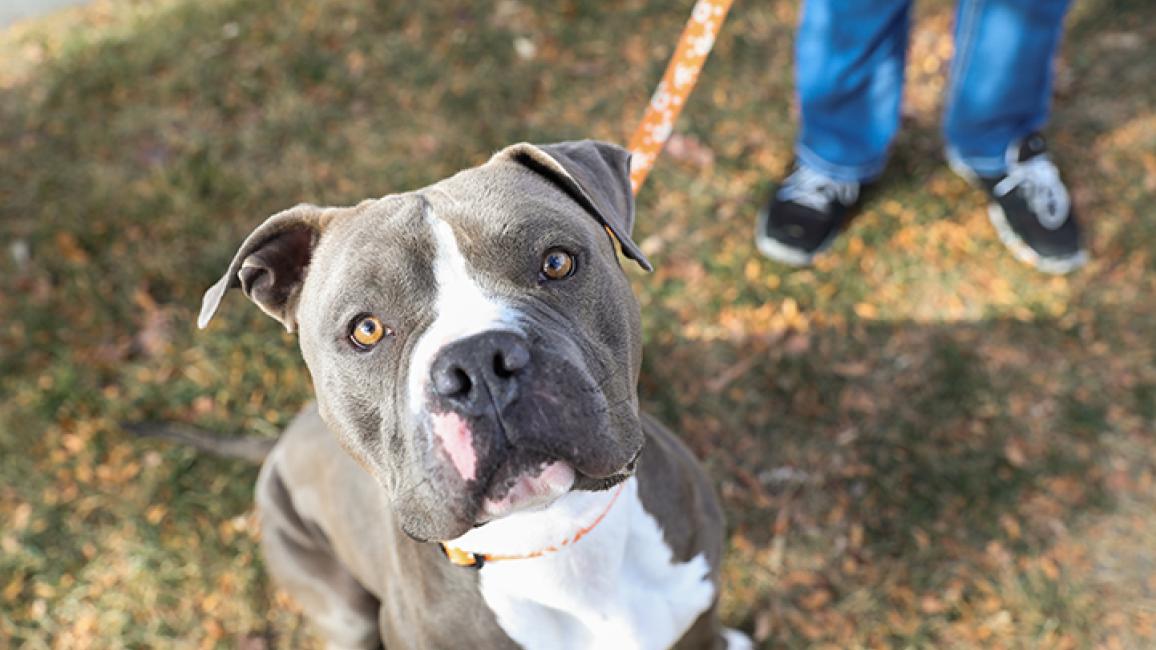How Kentucky Humane Society’s S.N.I.P. Clinic saves lives

The Kentucky Humane Society S.N.I.P. Clinic is in a small building tucked away on a side street near downtown Louisville. At first glance, it may seem quiet and unassuming, but the work being done inside prevents thousands of homeless pets from entering the city shelter each year.
When the Kentucky Humane Society (KHS) opened S.N.I.P. in 2007, it was the region’s only full-time public spay/neuter clinic. The goal was to reduce the number of animals surrendered to Louisville Metro Animal Services (LMAS), the city’s municipal shelter. Since it opened, KHS says the clinic has spayed or neutered more than 100,000 dogs and cats. And although the LMAS save rate rose each year since the S.N.I.P. Clinic opened, dogs identified as pit bulls were still at serious risk of being killed.

Since KHS and LMAS are Best Friends Network partners, they both are eligible to receive grants from Best Friends. To help save more of the pit-bull-terrier-like dogs in Louisville, KHS received its first grant in 2014 to provide free spay/neuter surgeries and to assist with an advertising campaign designed to lift the stigma associated with pit bull terriers.
Fast forward to 2018. Today, the S.N.I.P Clinic not only helps dogs of all shapes and sizes, but it also helps families on limited budgets who need affordable spay/neuter for their pets, as well as community cat caregivers.
More about the Best Friends Network
Free spay/neuter for dogs
“They (S.N.I.P.) are literally changing the landscape of the lifesaving community,” says Angela Rovetto, network specialist for Best Friends. “They are constantly looking at data to see where the gaps are in lifesaving, and then they change to meet those needs.”
Back in 2014, when KHS staffers noticed a critical need to help save the lives of pit bull terriers in Louisville, they knew that if families had access to free or low-cost spay/neuter, they could reduce the number of pets ending up in the shelter. The grant received that year from Best Friends enabled KHS to perform nearly 750 free spay/neuter surgeries for pit bull terriers. That total not only exceeded the KHS goal for the year, but thanks in part to support from Best Friends since 2014, KHS has been able to exceed 1,000 free spay/neuter surgeries for each of the past three years.

This year, Kentucky Humane Society received a Rachael Ray Save Them All Grant to fund 600 free spay/neuter surgeries at the S.N.I.P. Clinic. The grant will fund spay/neuter surgeries for big dogs of any type or breed.
About pit bull terriers
In addition to providing the community in prior years with free or low-cost spay/neuter for pit-bull-terrier-like dogs, KHS and LMAS, along with Saving Sunny, Inc. (another network partner) joined forces to change the negative stigma surrounding pit bull terriers and dogs who look like them. With help from Best Friends, the three partners launched a marketing campaign designed to celebrate these dogs and the families who love them.

“We wanted to show that you can’t stereotype the pit bull adopter,” says Andrea Blair, public relations and marketing director for KHS, who designed billboards featuring pit bulls with diverse types of families. “Billboards were seen all over the city, and local newspapers and magazines ran the ads for free. We had people thanking us for helping break down barriers to adoption.”
Why it’s important to spay or neuter your pet
Spay/neuter for community cats
In Louisville, KHS works with other Best Friends Network partners (including Alley Cat Advocates, Saving Sunny and My Dog Eats First) to offer spay/neuter assistance at S.N.I.P.
In fact, one of its most extensive partnerships is with Alley Cat Advocates. Community cats, which typically are outdoor cats unsocialized to people, are also at risk if they end up in shelters. Alley Cat Advocates relies solely on the S.N.I.P. Clinic for its spay/neuter surgeries.
Karen Little, executive director for Alley Cat Advocates, estimates that the S.N.I.P. Clinic has performed nearly 18,000 surgeries since collaboration between the two organizations began. “S.N.I.P. allows us to efficiently and effectively spay/neuter the number of community cats we hope to alter each year,” says Karen.

It’s not uncommon to visit the S.N.I.P. Clinic and find dogs and cats from nearby rural shelters in surrounding counties (and even southern Indiana) waiting for or resting from surgery. “Louisville is surrounded by rural communities that could really use our help,” says Andrea. “In some, there are no, or just one veterinarian.”
Collaboration key to saving pets
Ozzy Gibson, executive director at LMAS, credits the spay/neuter program and partnerships with other area organizations with cutting animal LMAS shelter intake in half — from nearly 14,000 in 2012 to nearly 7,000 in 2017.
“To me, collaboration is 100 percent important if we want to save lives,” he says. “The better we work together, the better the example we can be for other counties.” Gibson says that in 2017, for the first time in the 53-year history of LMAS, not one pet was euthanized there due to length of stay or lack of space.
“This is a great city to be in right now if you’re an animal or have animals,” says Andrea. “It’s a place that really cares about its pets, and we are always looking for new ways to help pets and people in need.”
How we’re working with you to Save Them All
Photos by Sarah Ause Kichas, Stacey Axelrod and Nicole Hamilton